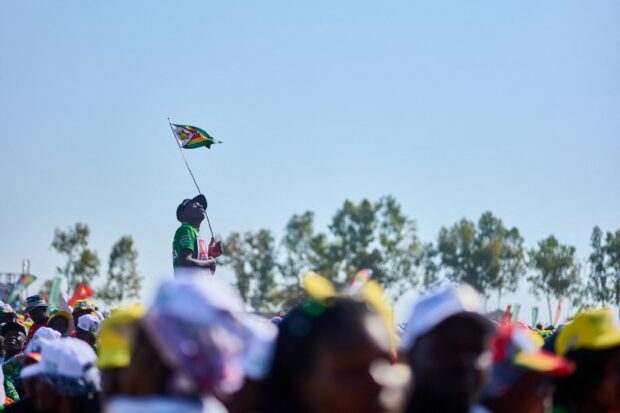
A supporter gestures while holding a Zimbabwe flag during a Zimbabwe African National Union Patriotic Front (ZANU-PF) election campaign rally in Shurugwi on Aug. 19, 2023. Zimbabweans will head to the polls on Aug. 23 to vote in general and presidential elections. (Photo by ZINYANGE AUNTONY / Agence France-Presse)
HARARE — Zimbabweans head to the polls next week, with the opposition claiming the electoral register is riddled with irregularities.
But what’s not contested are some of the quirky names on those voter rolls.
Some names certain to pop up on the register—which has not yet been made public—are Beatthem, Hardlife, Norest, Lovejoy, Hatred, Wisdom, Nomatter, Luckmore, Doubt, Thinkwell, and Guarantee.
Zimbabweans have some of the most unusual names on the continent, most steeped in events around their birth or parents’ personal experiences.
Zimbabwean Pride Ndlovu, 32, a car guard at a Johannesburg suburban shopping center in South Africa, said his parents would not reveal their secrets, but they hinted relations between them when his mother was pregnant saw him named Pride. His sibling is named Happyson.
Another Zimbabwean expat working at a Johannesburg wine bar, Desire Ndlovu, recalls a customer telling him he found it difficult to call him by his name in the presence of his wife.
“My wife can’t be calling you ‘Desire’ at 10 pm at night,” he quoted the customer as saying.
“I love my name, I wouldn’t have named myself better,” he added.
“In our culture, a name tells a whole story and the motivation to give a child a certain name can be a statement which the namer wants to make,” Charles Pfukwa, a names expert and dean in the faculty of social sciences at Zimbabwe’s Bindura University of Science Education, told AFP.
Background, convictions
In the early years of independence, the joy brought by the end of British colonial rule saw Zimbabweans give their children such names as Freedom and Liberty.
Then there are names associated with life’s tribulations such as Godknows, Nomatter or Anyway.
A father unsure about the paternity of a child would name the child Doubt, said Pfukwa.
Memory Chirere, a university of Zimbabwe English lecturer, may have taught hundreds of students in a career spanning more than three decades. But some students remain etched in his mind for their funny names.
“I remember students who had names like Comment, Eventhough, Fatness, Thinkwell, Atmosphere, Beatthem, Guarantee, Domuch, Laughter, Attack and Agreement,” he said.
“You don’t forget them. It helps you notice even their absence. You tend to give them more attention,” he added.
Most names are influenced by the parents’ social and cultural background as well as their convictions.
Footballer Hardlife Zvirekwi told AFP that his parents were going through tough times when he was born. They had just moved to the capital Harare from their rural home.
“Life was not easy in the city. My father who was a street vendor was struggling to make ends meet and when I was born life was hard so my father called me Hardlife.”
‘Not a joke’
Misery Chiwati changed her name to Mutsa (Shona for grace) after her third grade school teacher explained its meaning.
“I doubt that my parents knew the meaning of my name when my mother named me Misery,” she said.
In his book “What’s In A Name,” Alec Pongweni says employing English adjectives as names has connections to traditional use of Shona adjectival clauses as part of names.
“’Jealous’ was probably born in a polygamous marriage, where jealousy was rampant among competing wives,” he wrote, while ‘Psychology’ “would seem to have been picked because it sounds learned.”
The country’s agriculture minister is called Anxious Masuka.
At Johannesburg’s Sunninghill shopping center, another guard proudly wears a high visibility jacket with a name badge printed “My name is Perfect Size—glad to see you.”
“It’s not a joke, that’s my real name,” he said.
He was adopted by a man whose surname is Size after his mother abandoned him at a hospital in northwestern Hwange town.
“He named me Perfect because he wanted everything in my life to be perfect. At school I was an A-student. Unfortunately I can’t find a better job,” said the 28-year-old.—AFP
RELATED STORIES
Brics leaders meet in South Africa as bloc weighs expansion
11 West African nations commit to a military deployment to restore Niger’s ousted president